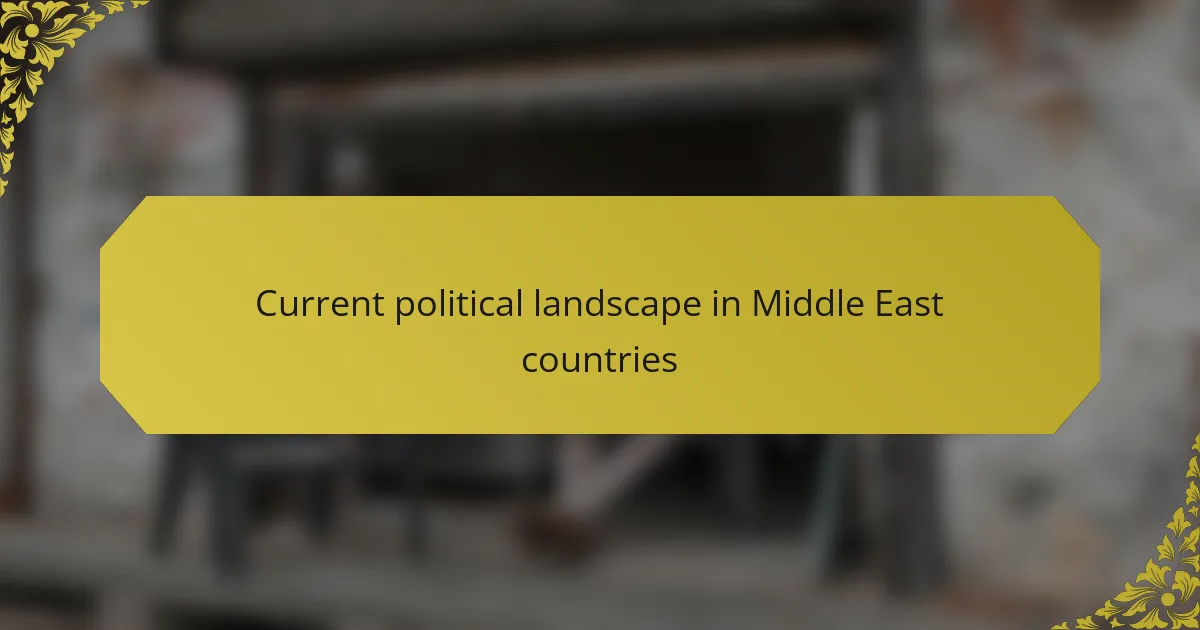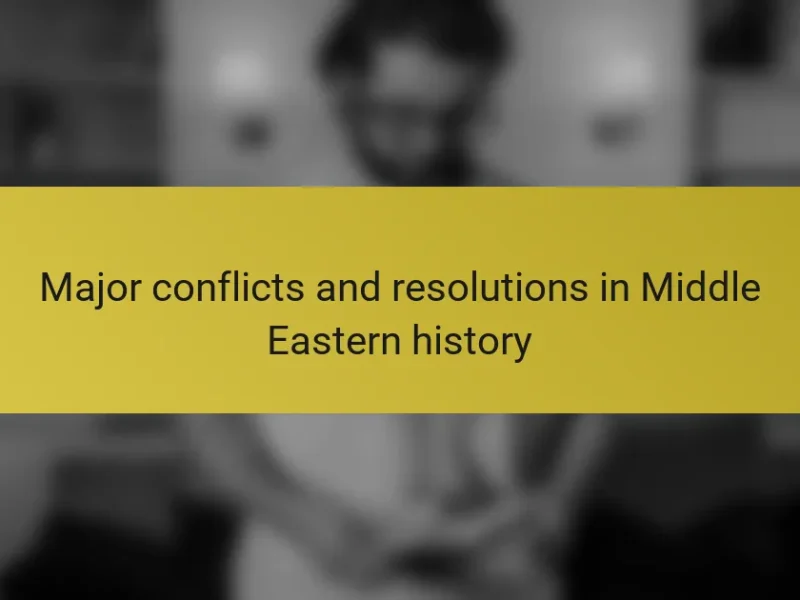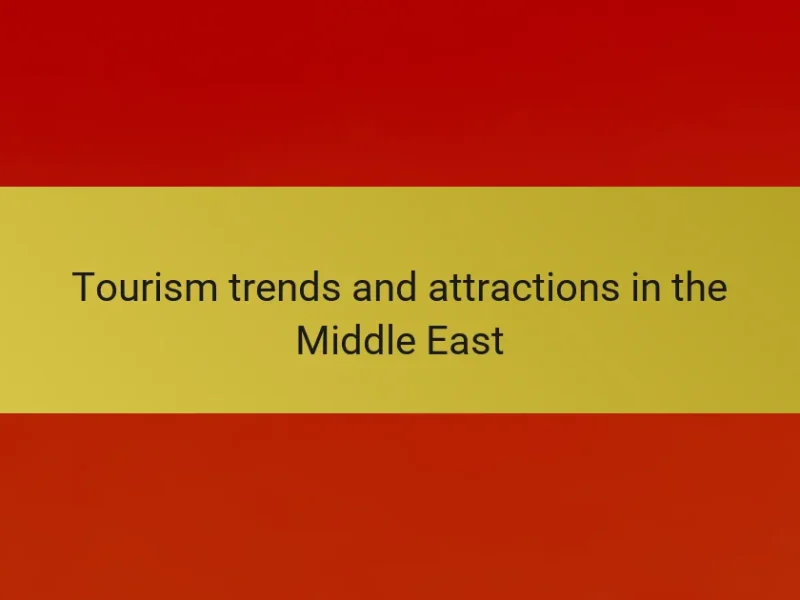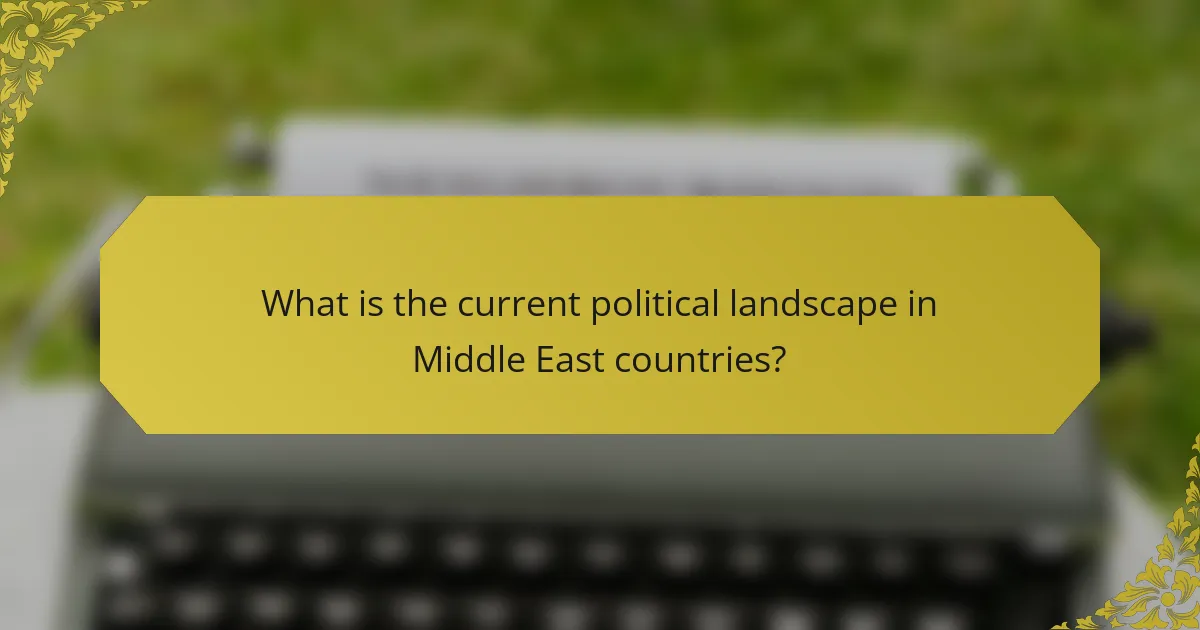
What is the current political landscape in Middle East countries?
The current political landscape in Middle East countries is characterized by ongoing conflicts, shifting alliances, and varying degrees of governance. Countries like Syria and Yemen are embroiled in civil wars, leading to humanitarian crises. In contrast, nations like the United Arab Emirates and Saudi Arabia maintain relative stability and economic growth. Iran’s influence is significant in the region, often creating tensions with neighboring countries and the West. The Israeli-Palestinian conflict remains unresolved, affecting regional dynamics. Political movements and protests continue to emerge, reflecting public discontent in places like Lebanon and Tunisia. Overall, the region is marked by complexity and volatility, with each country facing unique challenges and opportunities.
How do historical events shape the political landscape in the Middle East?
Historical events significantly shape the political landscape in the Middle East. The establishment of Israel in 1948 led to ongoing conflicts with Arab nations. The Suez Crisis of 1956 marked a shift in regional power dynamics. The Iranian Revolution in 1979 resulted in the rise of a theocratic regime, altering alliances. The Gulf War in 1990-1991 had lasting impacts on U.S. presence in the region. The Arab Spring in 2010-2011 triggered uprisings that reshaped governments across several countries. Each of these events contributed to ongoing instability and conflict. Historical grievances continue to influence current political ideologies and affiliations.
What major conflicts have influenced political dynamics in the region?
The major conflicts that have influenced political dynamics in the Middle East include the Arab-Israeli conflict, the Syrian Civil War, and the Iraq War. The Arab-Israeli conflict has shaped regional alliances and hostilities since the mid-20th century. It has led to multiple wars and ongoing tensions between Israel and its Arab neighbors. The Syrian Civil War, which began in 2011, has resulted in significant geopolitical shifts and humanitarian crises, affecting neighboring countries and global powers. The Iraq War, initiated in 2003, destabilized Iraq and contributed to the rise of extremist groups, influencing regional security and governance. Each of these conflicts has had profound implications for political relationships and power structures within the region.
How have colonial legacies impacted current governance structures?
Colonial legacies have significantly shaped current governance structures in Middle Eastern countries. Many nations adopted administrative frameworks established during colonial rule. These frameworks often prioritized central authority, which has led to authoritarian governance styles. For instance, the British and French colonial administrations implemented systems that concentrated power in the hands of a few. This concentration has persisted post-independence, resulting in limited political pluralism.
Furthermore, colonial borders often disregarded ethnic and sectarian divisions. This disregard has fueled ongoing conflicts and governance challenges. For example, Iraq’s borders, drawn by colonial powers, encompass diverse ethnic groups, leading to tensions and instability. Additionally, colonial legacies have influenced legal systems, with many countries retaining laws from their colonial past. This retention can hinder the development of more democratic and representative governance structures.
In summary, the impact of colonial legacies is evident in the centralization of power, ethnic divisions, and legal frameworks that continue to affect governance in the Middle East.
What are the key political entities in Middle Eastern countries?
Key political entities in Middle Eastern countries include nation-states, political parties, and non-state actors. Nation-states like Saudi Arabia, Iran, and Egypt hold significant power and influence. Political parties, such as the Ba’ath Party in Syria and the Justice and Development Party in Turkey, shape governance and policy. Non-state actors, including Hezbollah in Lebanon and various militant groups, also play crucial roles in regional dynamics. These entities interact within a complex web of alliances and conflicts, impacting stability and governance across the region.
What roles do governments play in shaping political discourse?
Governments play a crucial role in shaping political discourse. They influence public opinion through policies and regulations. Governments control media outlets and access to information. This control affects what narratives are promoted or suppressed. Additionally, governments often fund political education initiatives. These initiatives aim to shape citizens’ understanding of political issues. They also engage in public debates and forums. This engagement provides platforms for government viewpoints. Furthermore, governments may use social media to communicate directly with citizens. This direct communication can frame political discussions. Overall, government actions significantly impact the nature and direction of political discourse.
How do non-state actors influence the political environment?
Non-state actors influence the political environment by shaping public opinion, providing services, and challenging state authority. These actors include NGOs, religious groups, and militant organizations. They often fill gaps left by governments, especially in conflict zones. For example, in Syria, various non-state actors have provided humanitarian aid and social services. This has affected local governance and power dynamics. Additionally, non-state actors can mobilize grassroots support for political movements. Their actions can lead to significant changes in policy and governance. In the Middle East, such influences are particularly pronounced due to ongoing conflicts and power vacuums.
What are the current trends in political movements across the Middle East?
Current trends in political movements across the Middle East include a rise in grassroots activism and demands for democratic reforms. Many citizens are advocating for increased political participation and accountability. Social media plays a significant role in mobilizing protests and spreading awareness. Economic challenges, such as unemployment and inflation, are fueling discontent among the youth. Additionally, regional conflicts continue to influence political dynamics. The Arab Spring’s legacy still impacts movements, with some countries experiencing renewed calls for change. In places like Sudan and Lebanon, protests have emerged against corruption and governance issues. These trends indicate a growing desire for political transformation across the region.
How are grassroots movements affecting political change?
Grassroots movements are significantly influencing political change in Middle East countries. These movements often emerge from local communities advocating for social justice, democracy, and human rights. They mobilize citizens to challenge oppressive regimes and demand accountability. For example, the Arab Spring demonstrated how grassroots activism could lead to regime change in countries like Tunisia and Egypt. These movements use social media to organize protests and spread their messages widely. Research from the Carnegie Endowment for International Peace indicates that grassroots movements have reshaped political discourse in the region. They have also pressured governments to implement reforms and consider public opinion. Overall, grassroots movements are vital in driving political transformation in the Middle East.
What role does social media play in political mobilization?
Social media plays a crucial role in political mobilization by facilitating communication and organization among citizens. It allows individuals to share information rapidly and widely. Social media platforms enable grassroots movements to gain visibility and support. For example, during the Arab Spring, platforms like Twitter and Facebook were instrumental in organizing protests and disseminating information. Research by the Pew Research Center indicates that social media significantly influences political engagement, especially among younger demographics. Additionally, social media helps to bypass traditional media gatekeepers, allowing for direct communication between activists and the public. This direct line fosters a sense of community and shared purpose among mobilized individuals.
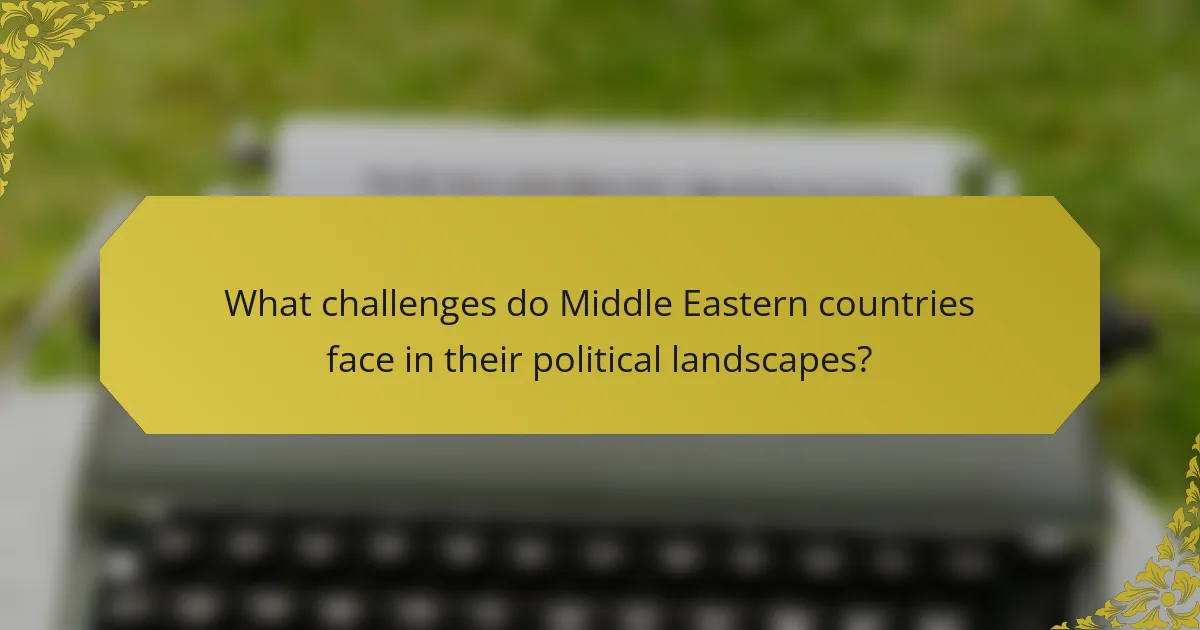
What challenges do Middle Eastern countries face in their political landscapes?
Middle Eastern countries face significant challenges in their political landscapes. These challenges include authoritarian governance, which limits political freedoms and civil rights. Sectarian conflicts often exacerbate tensions, leading to instability. Economic disparities create social unrest and dissatisfaction among citizens. Additionally, external influences from foreign powers complicate domestic politics. Corruption remains a pervasive issue, undermining public trust in government institutions. The lack of democratic processes hinders political participation and representation. These factors collectively contribute to a volatile political environment in the region.
How do economic factors impact political stability in the region?
Economic factors significantly impact political stability in the region. High unemployment rates can lead to social unrest. Inflation affects purchasing power and can provoke dissatisfaction among citizens. Economic inequality may create divisions that destabilize governance. Resource scarcity, particularly water and energy, can escalate tensions between communities. Foreign investment levels influence economic growth, which is crucial for maintaining stability. Countries with diversified economies tend to experience fewer political upheavals. Historical data shows that nations with strong economic performance often enjoy greater political stability. For example, the Gulf States have maintained relative stability due to their oil wealth and economic diversification efforts.
What is the relationship between oil dependence and governance?
Oil dependence significantly influences governance in Middle Eastern countries. Many governments rely heavily on oil revenues for economic stability. This reliance can lead to a lack of diversification in their economies. Consequently, it may foster authoritarian governance structures. Governments often use oil wealth to maintain social contracts with citizens. This can result in limited political freedoms and reduced accountability. For instance, countries like Saudi Arabia and Iran exhibit these patterns. Their governance models prioritize stability over democratic reforms due to oil wealth. Research shows that oil-rich states often experience weaker democratic institutions (Ross, 2012, “The Oil Curse”). This relationship highlights the complex dynamics between resource wealth and governance.
How do unemployment rates affect political unrest?
Unemployment rates significantly influence political unrest. High unemployment often leads to frustration and dissatisfaction among citizens. This frustration can escalate into protests and civil unrest. Historical examples include the Arab Spring, where rising unemployment fueled widespread protests in several Middle Eastern countries. In Tunisia, youth unemployment reached 30% before the uprising in 2010. Economic instability, often linked to high unemployment, creates a fertile ground for political discontent. Citizens demand better job opportunities and economic reforms. When governments fail to address these issues, unrest is likely to increase. Thus, the correlation between unemployment rates and political unrest is evident and well-documented.
What social issues contribute to political tensions in Middle Eastern countries?
Social issues contributing to political tensions in Middle Eastern countries include ethnic conflicts, religious sectarianism, and socio-economic disparities. Ethnic conflicts often arise from historical grievances and competition for resources. For instance, tensions between Kurds and Arabs in Iraq have led to political instability. Religious sectarianism, particularly between Sunni and Shia Muslims, fuels conflicts in countries like Syria and Bahrain. Socio-economic disparities, including high unemployment rates and poverty, exacerbate frustrations among youth. According to the World Bank, youth unemployment in the region averages over 25%. These social issues create an environment of unrest, leading to protests and demands for political change.
How do sectarian divides influence political affiliations?
Sectarian divides significantly influence political affiliations in Middle Eastern countries. These divides often correlate with religious, ethnic, or cultural identities. For instance, in countries like Iraq and Lebanon, sectarian identity shapes party loyalty and electoral behavior. Political parties frequently align along sectarian lines, representing specific groups. This alignment can lead to political fragmentation and instability. Research indicates that sectarianism often exacerbates tensions during elections, resulting in conflict. The Pew Research Center highlights that sectarian identities can predict voting patterns and political preferences. In summary, sectarian divides create a framework within which political affiliations are formed and maintained in the Middle East.
What is the impact of human rights violations on public opinion?
Human rights violations significantly shape public opinion. They often lead to increased public outrage and dissent. Violations can erode trust in governments and institutions. For instance, reports of torture or unlawful detentions can mobilize protests. In the Middle East, such violations have sparked movements like the Arab Spring. These movements reflect widespread dissatisfaction with oppressive regimes. Data shows that countries with high human rights abuses often experience civil unrest. This unrest can influence international perceptions and foreign policy decisions. Public opinion can shift towards calls for accountability and reform.
How do international relations shape the political landscape in the Middle East?
International relations significantly shape the political landscape in the Middle East. These relationships influence power dynamics and alliances among countries. For instance, the U.S. has long been a key ally to Israel, affecting regional stability. Conversely, Iran’s relationships with groups like Hezbollah challenge this stability. Additionally, the Arab Spring demonstrated how foreign support can impact domestic movements. Countries like Saudi Arabia have responded to regional tensions by forming coalitions, such as the Gulf Cooperation Council. Economic factors, like oil trade, also drive international relations, impacting political decisions. Historical conflicts, such as the Israeli-Palestinian issue, continue to affect diplomatic ties and regional politics. Thus, international relations are a crucial factor in shaping the Middle East’s political landscape.
What role do foreign powers play in regional conflicts?
Foreign powers significantly influence regional conflicts through military, economic, and diplomatic means. They often provide financial support to local factions, which can escalate tensions. For example, the U.S. has historically supported Israel, affecting the Israeli-Palestinian conflict. Conversely, Iran backs groups like Hezbollah, impacting Lebanese stability. Foreign interventions can lead to prolonged conflicts, as seen in Syria, where multiple nations have intervened. Additionally, foreign powers may impose sanctions to pressure governments, altering the balance of power. Their involvement can complicate peace processes, as differing interests clash. Overall, foreign powers shape the dynamics and outcomes of regional conflicts in the Middle East.
How do trade agreements influence political alliances?
Trade agreements influence political alliances by fostering economic interdependence among countries. This interdependence often leads to stronger diplomatic ties. Countries that engage in trade are more likely to collaborate on political issues. For example, the Gulf Cooperation Council (GCC) promotes economic and political unity among its member states. Additionally, trade agreements can enhance security cooperation. Nations may align politically to protect shared economic interests. Historical examples include the North American Free Trade Agreement (NAFTA) strengthening ties between the U.S., Canada, and Mexico. Such agreements can also create a platform for dialogue on broader geopolitical issues.
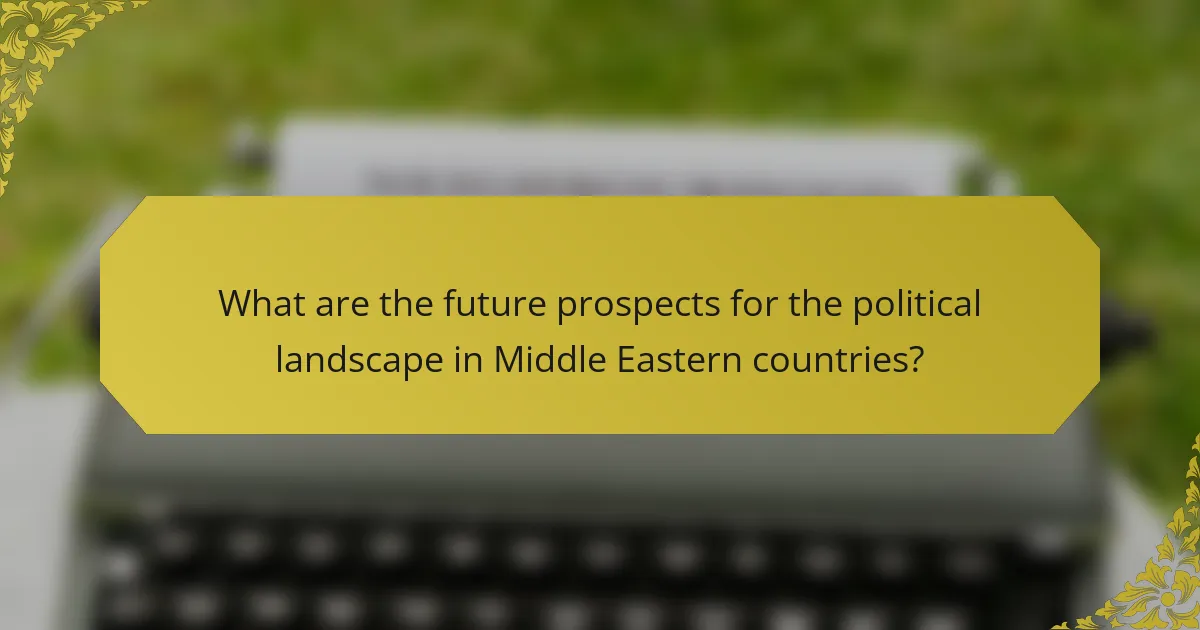
What are the future prospects for the political landscape in Middle Eastern countries?
The future prospects for the political landscape in Middle Eastern countries are likely to be shaped by ongoing social movements and geopolitical tensions. Many nations in the region are experiencing demands for democratic reforms. These movements often arise from widespread dissatisfaction with authoritarian regimes. Economic challenges, such as high unemployment rates, also fuel public unrest.
Additionally, the influence of external powers complicates local politics. Countries like the United States and Russia play significant roles in regional conflicts. The rise of non-state actors, such as militant groups, further destabilizes the political environment.
Moreover, climate change poses a threat to stability in the region. Water scarcity and resource competition may lead to increased conflict. Overall, the political future of the Middle East will be influenced by a complex interplay of internal and external factors.
What potential reforms could reshape governance in the region?
Decentralization of power could reshape governance in the region. This reform can empower local governments and enhance citizen participation. Increased transparency measures are also essential. They can reduce corruption and build public trust. Electoral reforms may improve representation and political accountability. Implementing these changes can lead to more responsive governance. Historical examples show that similar reforms have succeeded in other regions. For instance, Tunisia’s political transition has included significant governance reforms. These reforms have aimed to create a more inclusive political environment.
How can democratic processes be strengthened in Middle Eastern countries?
Democratic processes in Middle Eastern countries can be strengthened through electoral reforms, civil society engagement, and rule of law enhancement. Implementing fair and transparent electoral systems is crucial. Countries like Tunisia have shown that free elections can lead to democratic stability. Encouraging civil society organizations to participate in governance fosters accountability and public engagement. For instance, grassroots movements in Lebanon have pushed for political reform. Strengthening the rule of law ensures that laws are applied equally, which builds trust in governmental institutions. The World Bank reports that legal reforms can improve governance and reduce corruption. These measures collectively contribute to a more robust democratic framework in the region.
What role does education play in fostering political awareness?
Education plays a crucial role in fostering political awareness. It equips individuals with knowledge about political systems and civic responsibilities. Education encourages critical thinking and informed decision-making. This leads to higher participation in political processes. Studies show that educated individuals are more likely to vote and engage in civic activities. For example, a report by the World Bank highlights that increased education correlates with greater political engagement in the Middle East. Furthermore, education helps individuals understand their rights and the importance of governance. This understanding promotes active citizenship and accountability in political systems.
How might geopolitical shifts affect Middle Eastern politics in the coming years?
Geopolitical shifts will significantly impact Middle Eastern politics in the coming years. Changing alliances may alter power dynamics in the region. For instance, the normalization of relations between Israel and several Arab states could reshape regional security frameworks. Additionally, shifts in U.S. foreign policy, such as a potential withdrawal from the region, may embolden local powers like Iran. Economic partnerships with emerging global players, such as China, could influence trade and investment flows. These changes may lead to increased competition for influence among regional actors. Furthermore, ongoing conflicts could be exacerbated by external interventions or support. Historical precedents show that geopolitical realignments often result in both cooperation and conflict within the region.
What trends in global politics could influence Middle Eastern stability?
Shifts in global politics significantly influence Middle Eastern stability. Rising multipolarity is one trend, as countries like China and Russia increase their influence. This shift can lead to changes in alliances and power dynamics in the region. Additionally, U.S. foreign policy adjustments impact regional security arrangements. For instance, the U.S. withdrawal from Afghanistan has raised concerns about the resurgence of extremist groups.
Another trend is the growing focus on climate change and resource scarcity. Water shortages and desertification can exacerbate existing tensions. Furthermore, the increasing importance of economic partnerships, such as the Abraham Accords, can foster stability through cooperation.
Lastly, the global response to human rights issues influences political stability. International pressure on authoritarian regimes can lead to unrest or reform. These interconnected trends shape the geopolitical landscape and affect the overall stability of Middle Eastern countries.
How can regional cooperation be enhanced to address common challenges?
Regional cooperation can be enhanced through structured dialogue and trust-building measures. Establishing regular forums for communication among Middle Eastern countries fosters collaboration. Joint initiatives addressing shared issues, such as water scarcity and security threats, can strengthen partnerships. Economic integration through trade agreements encourages interdependence. Collaborative projects in renewable energy can provide mutual benefits. Sharing intelligence on security matters enhances collective safety. Engaging civil society in dialogue promotes grassroots support for cooperation. Historical examples, such as the Arab League’s initiatives, demonstrate the potential for effective regional collaboration.
What strategies can citizens employ to engage in the political process?
Citizens can engage in the political process through voting, advocacy, and community organizing. Voting is a fundamental way to influence government decisions. Citizens should educate themselves on candidates and issues before elections. Advocacy involves raising awareness about specific issues. This can be done through social media campaigns or public demonstrations. Community organizing helps build coalitions for collective action. Citizens can join local groups that focus on political change. Participating in town hall meetings allows citizens to voice their opinions directly to elected officials. Engaging in discussions and debates fosters a more informed electorate. These strategies empower citizens to impact the political landscape effectively.
The current political landscape in Middle Eastern countries is marked by ongoing conflicts, shifting alliances, and varying governance levels. Key issues include civil wars in Syria and Yemen, the influence of Iran, and the unresolved Israeli-Palestinian conflict, all contributing to regional instability. Historical events and colonial legacies have shaped governance structures, while economic factors like oil dependence and unemployment rates exacerbate political tensions. Grassroots movements and social media play pivotal roles in mobilizing citizens for political change, reflecting a growing demand for democratic reforms amidst authoritarian governance. The interplay of international relations and regional cooperation further complicates the political dynamics, presenting both challenges and opportunities for the future.
